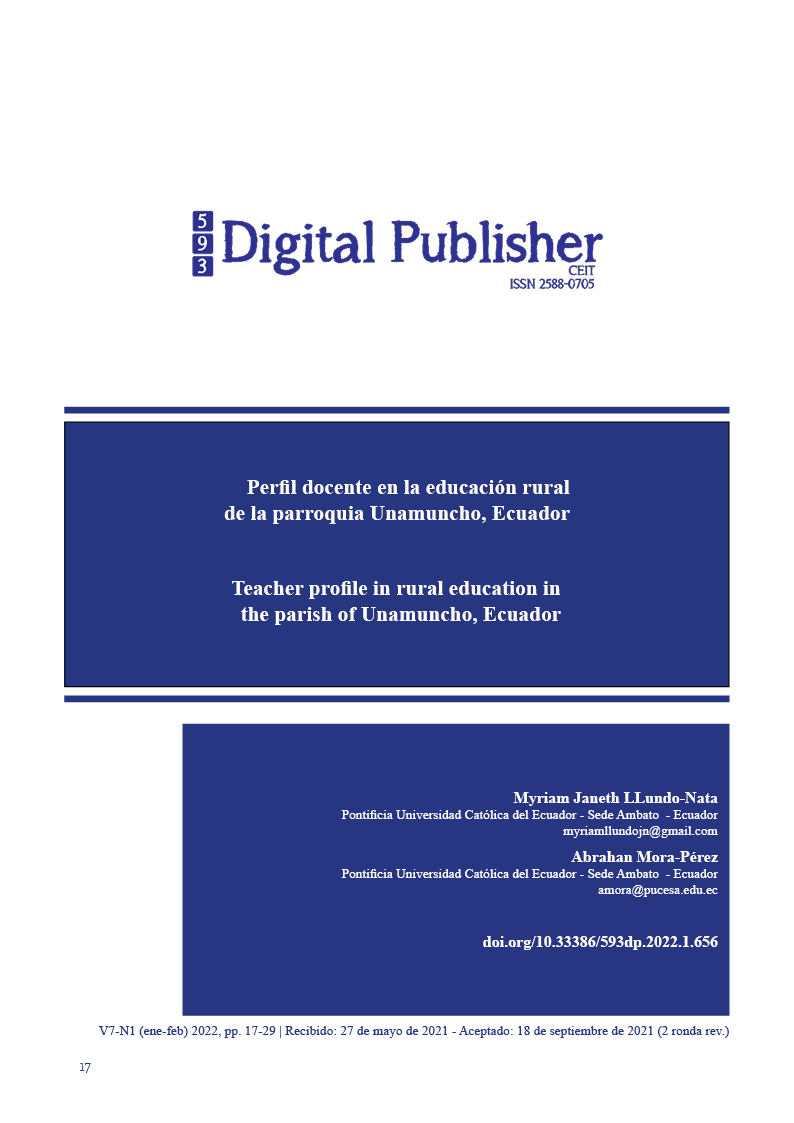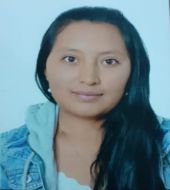Teacher profile in rural education in the parish of Unamuncho, Ecuador
Main Article Content
Abstract
The general objective of this research article was to establish the teaching profile of rural education of the Tomás Sevilla Educational Unit of the Unamuncho parish, Cantón Ambato and the importance in cultural identity in rural areas of Ecuador, the research approach was qualitative, with the help of the interview as a tool to establish the constructs of the teachers, which had a guide of open questions, focused on six topics: a) Professional performance, b) Teacher characteristics, c) Methodological strategies, d) Performance academic, e) Cultural diversity and d) Educational quality, 14 teachers of the 20 who belong to the establishment participated, concluding that the majority group of teachers have a love of teaching as a commitment to education, involved within their life project, a limited number of teachers have postgraduate studies, keep date in the management of the innovative learning tools as web 2.0, there are students who do not have access to quality connectivity, due to the limited economic level by their parents, in general the Educational Unit meets the objectives set out in the curriculum and student promotion. Concluding the ideal rural teaching profile must be composed of several essential aspects: teaching vocation as a life project, teachers committed to the work of educators, showing high credibility in their role, such as transparency in curricular and administrative processes, in addition to broad responsibility and willingness to leadership in the community; with specific professional competencies and constant training and education in innovative learning strategies and interest in research, the bilingual intercultural teacher must manifest an important struggle for the causes of the people they educate, in defense of the rights of cultural identity, the management of certain resources autonomously, allowing the permanence of traditions, for which the teacher must live interculturality itself, mastering the mother tongue of their students and the second language that is common to all citizens, teachers Rural communities must behave open to progress as well as to the innovations of the modern world, which can guarantee student generations of high educational quality, which will allow them to survive the new global changes.
Downloads
Article Details

This work is licensed under a Creative Commons Attribution-NonCommercial-ShareAlike 4.0 International License.
1. Derechos de autor
Las obras que se publican en 593 Digital Publisher CEIT están sujetas a los siguientes términos:
1.1. 593 Digital Publisher CEIT, conserva los derechos patrimoniales (copyright) de las obras publicadas, favorece y permite la reutilización de las mismas bajo la licencia Licencia Creative Commons 4.0 de Reconocimiento-NoComercial-CompartirIgual 4.0, por lo cual se pueden copiar, usar, difundir, transmitir y exponer públicamente, siempre que:
1.1.a. Se cite la autoría y fuente original de su publicación (revista, editorial, URL).
1.1.b. No se usen para fines comerciales u onerosos.
1.1.c. Se mencione la existencia y especificaciones de esta licencia de uso.
References
Aguerrondo, I. (2009). Conocimiento complejo y competencias educativas. UNESCO-IBE, 27–43. https://doi.org/10.5007/1983-4535.2011v4n1p27
Aguilera, M. (2018). Sentido de la cultura para el docente rural. REVENCYT, (31), 40–52.
Ardila, R. (2013). Los orígenes del conductismo, Watson y el manifiesto conductista de 1913. Revista Latinoamericana de Psicología, 45(2), 315–319. Retrieved from file:///C:/Users/Lenovo/Desktop/articulo de revisión/Dialnet-ConductismoCognitivismoYAprendizaje-4835877.pdf
Bastidas, M. (2015). Educación Intercultural Bilingüe en el Ecuador: Un estudio de la demanda social. Alteridad. Revista de Educación, 10(2), 180–189. https://doi.org/10.17163/alt.v10n2.2015.04
Boix, R., & Buscà, F. (2020). Competencias del Profesorado de la Escuela Rural Catalana para Abordar la Dimensión Territorial en el Aula Multigrado. REICE. Revista Iberoamericana Sobre Calidad, Eficacia y Cambio En Educación, 18(2), 115. https://doi.org/10.15366/reice2020.18.2.006
Calderón, A. (2015). Situación de la Educación Rural en Ecuador. In Situación de la Educación rural en Ecuador (Vol. 5). Retrieved from http://www.rimisp.org/wp-content/files_mf/1439406281ATInformeTecnicoSituaciondelaEducacionruralenEcuado.pdf
Canaza-Choque, F. (2018). Educación y desigualdad en el Perú: rupturas y redes de esperanza en el plan de vivir junto. Ucv Hacer, 7(2), 69–79. https://doi.org/10.18050/revucvhacer.v7n2a8
Cantos, M., & Reyes, J. (2018). El nuevo modelo de gestión educativa y su impacto en las escuelas de educación básica del cantón Cañar, Ecuador. Revista Killkana Sociales, 2(4), 1–8. https://doi.org/10.26871/killkana_social.v2i4.100
Carrasco, C., Luzón, A., & López, V. (2019). Identidad docente y políticas de accountability: el caso de Chile. Estudios Pedagogicos, 45(2), 121–139. https://doi.org/10.4067/S0718-07052019000200121
Castro Miranda, R. (2018). El desarrollo de competencias para el trabajo docente en escuelas multigrado. RIDE, 8(16), 335–350. https://doi.org/10.23913/ride.v8i16.344
Charry, P. (2019). Hacia una educación rural inclusiva. Revista Nacional e Internacional de Educación Inclusiva, 12(1), 225–246.
Chavez, N., & Martínez, O. (2016). Una nueva mirada sobre la formación docente. Revista Científica Universidad y Sociedad, 8(4), 14–21.
Conejo, A. (2008). Educación Intercultural Bilingüe en el Ecuador. La propuesta educativa y su proceso. Alteridad. Revista de Educación, 3(2), 64–82. https://doi.org/10.35562/elad-silda.579
Cragnolino, E., & Lorenzatti, M. (2016). Formacion docente y escuela rural . Dimensiones para abordar analíticamente esta problemática . Razón y Palabra, 63–76.
Del Moral, E., Villalustre, L., & Neira, M. (2014). Variables asociadas a la cultura innovadora con TIC en escuelas rurales. Revista Del Currículum y Formación Del Profesorado, 18(3), 9–25.
Díaz, M. P. (2016). Origen y configuración de la vocación docente : Análisis de la Asociación “ La Tribu Educa .” Universidad de Sevilla.
Eguren, M., & de Belaunde, C. (2019). No era vocación, era necesidad (I. de E. Peruanos, Ed.). Retrieved from http://repositorio.minedu.gob.pe/handle/MINEDU/6625
Flores, M., Ortega, M., & Sánchez, M. (2021). Las nuevas tecnologías como estrategias innovadoras de enseñanza-aprendizaje en la era digital. Revista Electrónica Interuniversitaria de Formación Del Profesorado, 24(1), 29–42. Retrieved from http://revistas.um.es/reifop
Franco, J., Vélez, F., López, H., & Becerra, M. (2017). Análisis de relevancia para la valoración de la vocación docente a partir de variables extrínsecas e intrínsecas: Caso colegios del área metropolitana de Medellín - Colombia. Revista Espacios, 38(20), 1–10.
Freré, F., & Saltos, M. (2013). Materiales Didácticos Innovadores Estrategia Lúdica en el Aprendizaje. Ciencia Ciencia UNEMI, 6(10), 25–34. https://doi.org/10.29076/issn.2528-7737vol6iss10.2013pp25-34p
Fuentealba, R., & Imbarack, P. (2014). Compromiso docente, una interpelación al sentido de la profesionalidad en tiempos de cambio. Estudios Pedagogicos, 40(1), 257–273. https://doi.org/10.4067/s0718-07052014000200015
Gálvez, E., & Milla, R. (2018). Evaluación del desempeño docente: Preparación para el aprendizaje de los estudiantes en el Marco de Buen Desempeño Docente. Journal of Educational Psychology - Propositos y Representaciones, 6(2), 407–452.
Gómez, M., & Lopez, A. (2016). Diagnóstico De La Situación Educativ - Laboral De Los Jóvenes De 18 A 25 Años De Las Parroquias Rurales Del Cantón Ambato – Ecuador. Augusto Guzzo Revista Académica, (17), 9–20.
Hidalgo, M., Tenorio, G., & Ramírez, M. (2016). Atributos de innovación en el desarrollo de competencias digitales en educación básica usando recursos educativos abiertos en una comunidad rural de Colombia. CPU-E, (22), 52–73.
Huanca-Arohuanca, J., & Canaza-Choque, F. (2019). Puno: Educación rural y pensamiento crítico. Hacia una educación inclusiva. Revista Helios, 3(1), 97–98. https://doi.org/10.22497/Helios.31.3106
Juárez, D., & Lara, E. (2018). Procesos de enseñanza en escuelas rurales multigrado de México mediante comunidades de aprendizaje. Tendencias Pedagógicas, (31), 149–163.
Márquez, A. (2017). Educación y desarrollo en la sociedad del conocimiento. Perfiles Educativos, 39(158), 3–17. https://doi.org/10.22201/iisue.24486167e.2017.158.58635
Martínez-Izaguirre, M., Yániz, C., & Villardón-Gallego, L. (2017). Competencias profesionales del profesorado de educación obligatoria. Revista Iberoamericana de Educación, 74, 171–192.
Martínez, M. (2006). La investigación cualitativa (síntesis conceptual). Revista IIPSI, 9(1), 123–146.
Minor-Jiménez, M., & Cortés-Dueñas, A. (2019). Percepción de la importancia de las competencias tecnológicas en docentes de escuelas rurales. Revista Electrónica En Educación y Pedagogía, 3(4), 57–71.
Mujica, F., & Orellana, N. (2018). Autopercepción de la vocación en docentes de educación física escolar en Chile. CPU-E, 5–32.
Núñez-Rojas, N., & Díaz-Castillo, D. (2017). Perfil por competencias gerenciales en directivos de instituciones educativas. Estudios Pedagógicos, 43(2), 237–252.
Ramírez, B., & Gutiérrez-Ríos, M. (2018). Tendencias actuales en la formación de maestros para la ruralidad en Colombia y Latinoamérica. Revista Tecné, Episteme y Didaxis, 1–15.
Ramos, R. (2019). Fortalecer la oralidad utilizando estrategias innovadoras Tra. Universidad Nacional de Tumbes.
Restrepo-Ochoa, D. (2013). La Teoría Fundamentada como metodología para la integración del análisis procesual y estructural en la investigación de las Representaciones Sociales. CES Psicología, 6(1), 122–133. https://doi.org/10.21615/2579
Ribadeneira, F. (2020). Estrategias didácticas en el proceso educativo de la zona rural. Revista Conrado, 16(72), 242–247.
Salvador, E., & Sánchez, J. (2018). Liderazgo de los directivos y compromiso organizacional Docente. Revista de Investigaciones Altoandinas - Journal of High Andean Research, 20(1), 115–124. https://doi.org/10.18271/ria.2018.335
Sánchez-Lissen, E. (2009). Dos caras de la carrera docente: satisfacción y desmotivación. Pedagogía Social. Revista Interuniversitaria, (16), 135–148.
Torres, R. (2004). Nuevo rol docente: ¿Qué modelo de formación, para qué modelo educativo? RED ACADÉMICA Universidad Pedagógica Nacional, (47), 1–19.
Valerio, C., Vanegas, J., González, L., & Bernal, J. (2019). La educación rural “ no es un concepto urbano”. Revista de La Universidad de La Salle, 2019(79), 15–40. Retrieved from https://ciencia.lasalle.edu.co/cgi/viewcontent.cgi?article=2236&context=ruls



